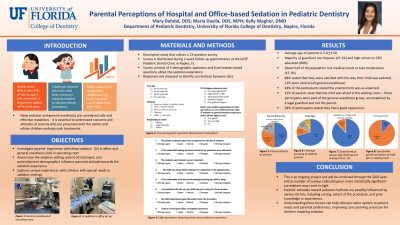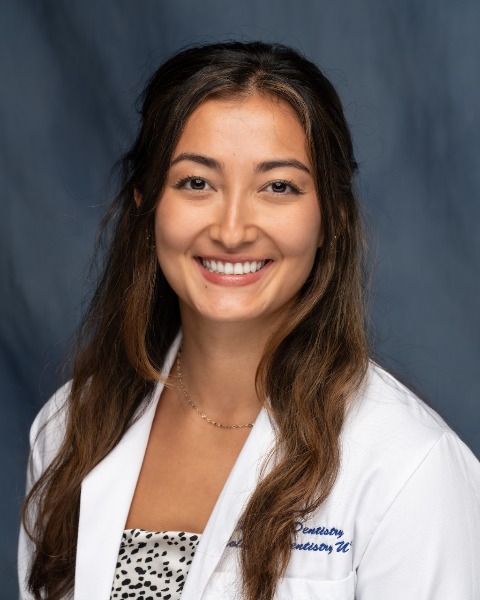Sedation
399 - Parental Perceptions of Hospital and Office-based Sedation in Pediatric Dentistry
Saturday, May 24, 2025
2:30 PM - 2:45 PM MDT

Has Audio

Mary Dahdal, DDS
Resident
University of Florida-Naples
University of Florida
Naples, Florida, United States- MC
Matthew Cooke, DDS, MD, MPH
Program director
University of Florida
Gainesville, Florida, United States
Presenting Author(s)
Program Director(s)
Abstract:
Purpose: Deep sedation (DS) and general anesthesia (GA) are safe and effective modalities for delivering compassionate dental care to children who are unable to tolerate traditional procedures. It is essential for clinicians to understand the concerns and perspectives of parents whose children undergo such treatments. This study aims to investigate parents' experiences with DS/GA. Specifically, it examines how sedation setting (hospital vs. office), extent of dental treatment, and patient and parent demographics influence parental attitudes toward the experience. Additionally, the study explores the unique experiences of children with special needs in sedation settings, providing valuable insights into how their care can be optimized.
Methods: This descriptive study uses a 13-question survey, distributed during two-week follow-up appointments at the NCEF Pediatric Dental Clinic in Naples, Florida. The survey consists of 5 demographic questions and 8 perception-based questions about the sedation experience. Responses are analyzed to identify correlations between data.
Results: 17 surveys have been collected and reviewed. The mean child’s age is 6 years, with 47% of parents identifying as Hispanic. Nearly half (n=8) of the patients report previous sedation. 94% of parents (n=16) reported an overall good sedation experience regardless of treatment rendered. This is an ongoing project and will be continued through the 2025 year.
Conclusions: Parents’ attitudes toward sedation methods are possibly influenced by various factors, including setting, extent of the procedure, and prior knowledge or experiences. Understanding these factors can help clinicians tailor options to patient needs and parental preferences, improving care-planning processes for children requiring sedation.
Identify Supporting Agency and Grant Number:
Purpose: Deep sedation (DS) and general anesthesia (GA) are safe and effective modalities for delivering compassionate dental care to children who are unable to tolerate traditional procedures. It is essential for clinicians to understand the concerns and perspectives of parents whose children undergo such treatments. This study aims to investigate parents' experiences with DS/GA. Specifically, it examines how sedation setting (hospital vs. office), extent of dental treatment, and patient and parent demographics influence parental attitudes toward the experience. Additionally, the study explores the unique experiences of children with special needs in sedation settings, providing valuable insights into how their care can be optimized.
Methods: This descriptive study uses a 13-question survey, distributed during two-week follow-up appointments at the NCEF Pediatric Dental Clinic in Naples, Florida. The survey consists of 5 demographic questions and 8 perception-based questions about the sedation experience. Responses are analyzed to identify correlations between data.
Results: 17 surveys have been collected and reviewed. The mean child’s age is 6 years, with 47% of parents identifying as Hispanic. Nearly half (n=8) of the patients report previous sedation. 94% of parents (n=16) reported an overall good sedation experience regardless of treatment rendered. This is an ongoing project and will be continued through the 2025 year.
Conclusions: Parents’ attitudes toward sedation methods are possibly influenced by various factors, including setting, extent of the procedure, and prior knowledge or experiences. Understanding these factors can help clinicians tailor options to patient needs and parental preferences, improving care-planning processes for children requiring sedation.
Identify Supporting Agency and Grant Number:

.jpg)